The topic of this article may not meet Wikipedia's general notability guideline .(July 2022) |
Hans Alfred von Eulitz (13 September 1866 - 28 November 1945) was a Saxon Army officer who served during World War I.
The topic of this article may not meet Wikipedia's general notability guideline .(July 2022) |
Hans Alfred von Eulitz (13 September 1866 - 28 November 1945) was a Saxon Army officer who served during World War I.
He was born on 13 September 1866 in the Kingdom of Saxony. He entered the military in 1886 as a Second-Lieutenant. In 1893, he was promoted to Premier Lieutenant, to Hauptmann in 1899, to Major in 1906, and to Oberstleutnant in 1912. In the same year, Eulitz became a staff officer in the XII (1st Royal Saxon) Corps, commanded by Karl Ludwig d'Elsa. In 1914, Eulitz became the corps's chief of staff. [1] He participated in battles on the Western Front. On 14 September 1916, he became commander of the 45th Infantry Brigade. After two months was named chief of staff of Armeeabteilung A. [2] Then, in 1917, he was transferred to the Grand Headquarters. In May of that year Eulitz became an aide-de-camp to King Frederick Augustus III of Saxony; and on 6 November he was promoted to Generalmajor. Near the war's end, during a meeting with Paul von Hindenburg and Erich Ludendorff, he voiced the position that an armistice was necessary. [3] He retired from the army on 4 July 1919. [4]

Helmuth Karl Bernhard Graf von Moltke was a Prussian field marshal. The chief of staff of the Prussian Army for thirty years, he is regarded as the creator of a new, more modern method of directing armies in the field and one of the finest military minds of his generation. He commanded troops in Europe and the Middle East, in the Second Schleswig War, Austro-Prussian War and Franco-Prussian War. He is described as embodying "Prussian military organization and tactical genius". He was fascinated with railways and pioneered their military use. He is often referred to as Moltke the Elder to distinguish him from his nephew Helmuth von Moltke the Younger, who commanded the German Army at the outbreak of the First World War.

Karl Konstantin Albrecht Leonhard Graf von Blumenthal was an officer of the Prussian Army and field marshal of the Imperial German Army, chiefly remembered for his decisive intervention at the Battle of Königgrätz in 1866, his victories at Wörth and Weißenburg, and above all his refusal to bombard Paris in 1870 during the siege, of which he was in command.

Ludwig August Ritter von Benedek, also known as Lajos Benedek, was an Austro-Hungarian general (Feldzeugmeister), best known for commanding the imperial army in 1866 in their defeat at the Battle of Königgrätz against the Prussian Army, which ended his career.

Max Clemens Lothar Freiherr von Hausen was a German army commander. He participated in the Austro-Prussian and Franco-German Wars and became Generaloberst of Saxon troops and War Minister in the Kingdom of Saxony. At the beginning of the First World War, he was the head of the Third Army which he led during the Battles of the Frontiers, Charleroi, and the Marne. He was relieved of his command because of illness in September 1914.
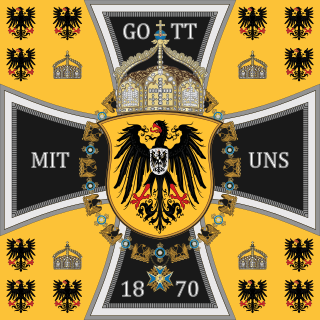
The Imperial German Army (1871–1919), officially referred to as the German Army, was the unified ground and air force of the German Empire. It was established in 1871 with the political unification of Germany under the leadership of Prussia, and was dissolved in 1919, after the defeat of the German Empire in World War I (1914–1918). In the Federal Republic of Germany, the term Deutsches Heer identifies the German Army, the land component of the Bundeswehr.
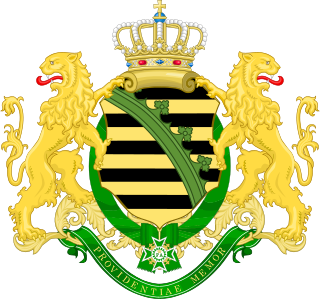
The Royal Saxon Army was the military force of the Electorate (1682–1807) and later the Kingdom of Saxony (1807–1918). A regular Saxon army was first established in 1682 and it continued to exist until the abolition of the German monarchies in 1918. With the formation of the Confederation of the Rhine by Napoleon the Royal Saxon Army joined the French "Grande Armée" along with 37 other German states.
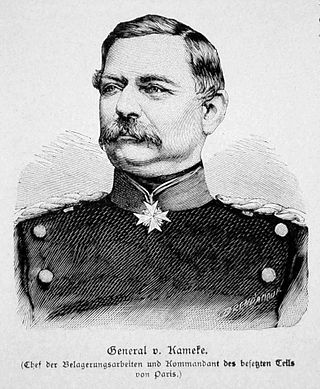
Arnold Karl Georg von Kameke was a Prussian General of the Infantry and Minister of War.
Hans Karl Georg von Kaltenborn-Stachau was a Prussian General of the Infantry and Minister of War.
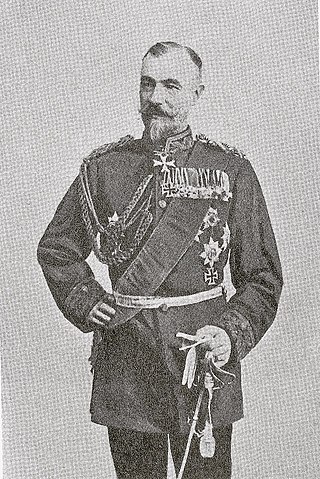
Walther Franz Georg Bronsart von Schellendorff, Dr. jur. h.c., was a Prussian General of the Infantry à la suite, Adjutant-General to the Kaiser and King, and Prussian Minister of War.

Friedrich August Eberhard, Prince of Württemberg was a royal Prussian Colonel General of the Cavalry with the rank of Generalfeldmarschall and Kommandierender General of the Guards Corps for more than 20 years. August was a member of the House of Württemberg and a Prince of Württemberg by birth.

Cyrus Ballou Comstock was a career officer in the Regular Army of the United States. After graduating from the United States Military Academy at West Point in 1855, Comstock served with the Army Corps of Engineers. At the beginning of the American Civil War, he assisted with the fortification of Washington, D.C. In 1862, he was transferred to the field, eventually becoming chief engineer of the Army of the Potomac. In 1863 during the Siege of Vicksburg, he served as the chief engineer of the Army of the Tennessee.

The 20th Uhlans "King William I" was a cavalry regiment of the Army of Württemberg. The regiment was formed as dragoons in 1809, and was reorganized as uhlans in 1871. The regiment took part in Napoleon's Russian campaign, the Austro-Prussian and Franco-Prussian war. In World War I it served as divisional cavalry for the 26th Division. Formally disbanded on May 1, 1919, the regiment existed until September 1920 as Abwicklungsstelle. The 1st Squadron/18th Horse bore the regiment's tradition in the new Reichsheer.

Hugo Ewald Graf von Kirchbach was a Prussian general who commanded the Prussian V Corps during the Franco-Prussian War.

Rudolph Bodo Hans von Kirchbach was a Royal Saxon army officer who was a Generaloberst in the First World War and awarded the Pour le Mérite.

Karl Ludwig d'Elsa was a Royal Saxon army officer who was a Generaloberst in the First World War and awarded the Pour le Mérite.

Franz Freiherr von John was an Austrian Feldzeugmeister, Chief of the General Staff, and Minister of War.

Wilhelm Ludwig Karl Kurt Friedrich von Tümpling was a Prussian General der Kavallerie. Tümpling commanded a division in the Austro-Prussian War and VI Army Corps during the Franco-Prussian War.

Hans Adolf Julius von Bülow was a General of the Artillery in the Imperial German Army. He was the Inspector-General of Artillery from 1879 to 1882. He retired when he had conflicts with Georg von Kameke, the Minister of War.

Franz Martin Chales de Beaulieu was a German general in World War I. He was also involved in the Herero Wars as chief of staff to Lothar von Trotha.
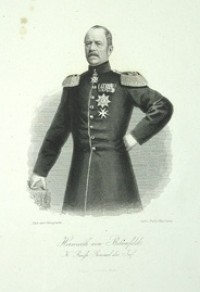
Friedrich Adrian Herwarth von Bittenfeld was a Prussian General of the Infantry. He was known for being the younger brother of Field Marshal of Eberhard Herwarth von Bittenfeld and commanding the 4th Division during the Austro-Prussian War.